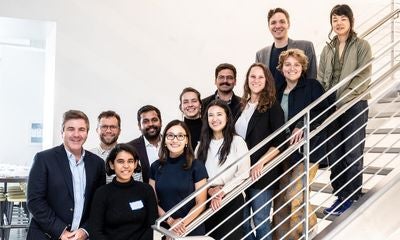- Resources
- Three takeaways on the Green Workforce Revolution at Climate Week NYC
Resources
Three takeaways on the Green Workforce Revolution at Climate Week NYC
Published: October 3, 2024 by Sophie Marx
Wrapping up its 15th year, New York City’s 2024 Climate Week brought together over 600 events and workshops designed to propel private sector action towards the climate crisis.
This year, a clear theme emerged: any company that wants to meet its declared net zero goals will need a workforce equipped with the correct set of skills to lead the way.
The data backs this up. Employer demand for a green workforce is outgrowing the supply of that workforce by double.
EDF is no stranger to providing the talent and resources needed for companies to turn their pledges into progress. EDF’s Climate Corps program provides the private sector with uniquely trained talent to help give their sustainability teams a much-needed capacity boost. Climate Corps has been around longer than Climate Week NYC, which means that while we have years of expertise in expanding the green workforce, we know there is always more to learn about the ever-changing landscape of sustainability.
Three things about green jobs stood out to me in events and conversations with companies during Climate Week NYC:
- Skills based hiring is here to stay. And it’s the single most effective way to solve the supply and demand gap of green workers. Instead of requiring degrees and decades of experience in jobs that have ‘sustainability’ in the title, employers are starting to recognize candidates’ readiness and skills that can be put towards sustainability goals. There is also a need to widen the range of skills we consider to be crucial to the green jobs movement, such as project management, accounting and communications. Importantly, skills-based hiring ensures a diverse set of folks will have access to high paying and secure green jobs without requiring deep prior sustainability experience or advanced degrees.
- Companies need to embed upskilling into net zero plans from Day 1. As demand for green talent outpaces supply, companies that address human capital needs from the outset will have the competitive advantage. While splashy climate goals make headlines, it’s pragmatic, tangible solutions that will move the needle. This means companies need to map which current staff need opportunities for upskilling, which new roles will need to be created, and then how the budget will accommodate these human capital needs.
- We need to transform every job into a climate job. The reality is, there are simply not enough folks on the planet who have done this job before. Companies can play a major role in upskilling their own employees, and that doesn’t always mean creating a large sustainability team. Instead, companies need to have champions in every sector – whether it be human resources, legal or procurement. Robust learning resources – such as Project Drawdown’s Job Function Action Guides, OnePointFive or EDF’s Net Zero Action Accelerator – can help employees “green” their job. The bottom line: radical collaboration is the name of the game.
The good news? EDF has a variety of programs for companies who are endeavoring to solve these learnings. If your current employees need additional resources and skills to get to zero, visit the Net Zero Action Accelerator. And if you’re a company with a net zero goal and need a capacity boost, apply to become a Climate Corps host today.




